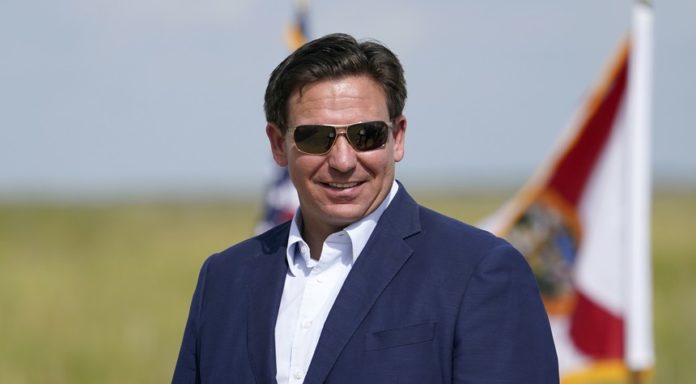The No Patient Left Alone Act was signed by Ron DeSantis, Florida Governor, on July 5. It addresses some of the worst wrongs that the COVID-19 pandemic has caused. Hospitals across the country denied patients access to their beds during the pandemic. The same was true for nursing homes and other long-term care facilities. Florida law no longer allows the closure of healthcare facilities for family visits.
DeSantis stated that the law increases patient protections and guarantees Florida families a fundamental right of Florida residents to visit loved ones in Florida hospitals, long-term care facilities, and hospices. It also prohibits facilities from requiring family members to receive COVID-19 vaccines to allow them to visit. The law also bans policies that restrict physical contact such as hugging loved ones. DeSantis said, “This allows families to be there for patients when it is most important.”
DeSantis met with a woman from Florida who made national headlines during the pandemic. Mary Daniel was the wife of an Alzheimer’s patient and was living in Florida in long-term care when the pandemic started. After work, she visited her husband and spent every evening with him. She kissed her husband goodnight on March 11, 2020. The staff called her on March 12 and told her she couldn’t come back. Daniel’s words:
He would be hurt by isolation, I knew. Alzheimer’s dementia patients and me specifically, the human contact with him, the hand holding, back rubbing, and the human contact was the most important. I was unable to talk to him over the phone. I could not talk to him via FaceTime. His verbal abilities are very limited. He speaks but I don’t understand his words.
There was no way we could have a conversation. Because he couldn’t understand what I was doing, he would kiss the iPad. He cried through two window visits. He didn’t really understand why you weren’t here or why you were not with me. He didn’t have any knowledge or a cognitive understanding of the virus. He didn’t know what it was, and he didn’t understand what it was.
She spent 114 days advocating on behalf of herself and other families and finding a way to return to the same daily routine that her husband used to. Daniel was the focus of national media attention after she became a part-time dishwasher at her husband’s home to keep an eye on him. She started connecting with families in similar circumstances and created a Facebook group of 14,000 people when she interviewed for American Thought Leaders.
DeSantis met with Casey during the process and listened attentively to her story. She was part of task forces that sought to find ways to reconnect families and patients in the state. “Governor DeSantis is, without doubt, the leader in getting us back to our loved one. We met for a conversation and then he announced that a Long-Term Care Task Force was being established to open Florida’s facilities.
DeSantis initially issued executive orders to allow families to return home with their loved ones. These activities led to the law that DeSantis signed Tuesday. Residents in other states, particularly those in hard lockdowns were not able to have a similar advocate at the governor’s mansion. Patty Heffernan (a Michigan resident) lost her brother to heart disease during the pandemic.
Her mother, a 96-year-old woman, was unable to grieve the loss of her child. She is fully cognizant and requires assisted living. Her mother was not allowed to be comforted by her family. Only staff members were allowed to touch her mother. Heffernan stated, “It stays with your mom forever. We got no closure and could not gather in our grief. Only five people were able to attend his funeral. This was enough to accommodate his immediate family.
Needless to state, Governor Gretchen Whitmer didn’t help Heffernan and other families in similar situations. She was too busy placing COVID-positive patients in facilities such as Heffernan’s mother’s and making sure that no one could purchase seeds at Walmart.
Every patient should have the right to visit relatives. Every patient should have an advocate. Every family member should be able to observe the loved one’s care and ask questions. As Daniel explained:
After 114 days, I found that there were still light bulbs in Steve’s room when I visited him. His remote control had disappeared from his TV. His toenails hadn’t been cut for 114 days when I took his shoes off and put him to bed. He was very meticulous about his appearance. His golf shirts were not dried. They were hung.
Because he was meticulous about his clothes and took great care of them, he has every shirt he ever owned in that closet. I was shocked when I saw his shoes. Is that neglect? He doesn’t know it, and he doesn’t even realize it. It’s obvious to me. How do you imagine that after 300 days?
It is a cruel act to make people die in isolation, regardless of their surroundings. This happened to COVID patients. This happened to many Americans who were hospitalized for other diseases and long-term care facilities. It is shocking that caregivers and healthcare administrators across the country imposed policies that isolated these patients. Anyone who has ever witnessed a death will know this.
It will never happen again in Florida thanks to Mary Daniel’s work and Governor DeSantis’s decisive action.




